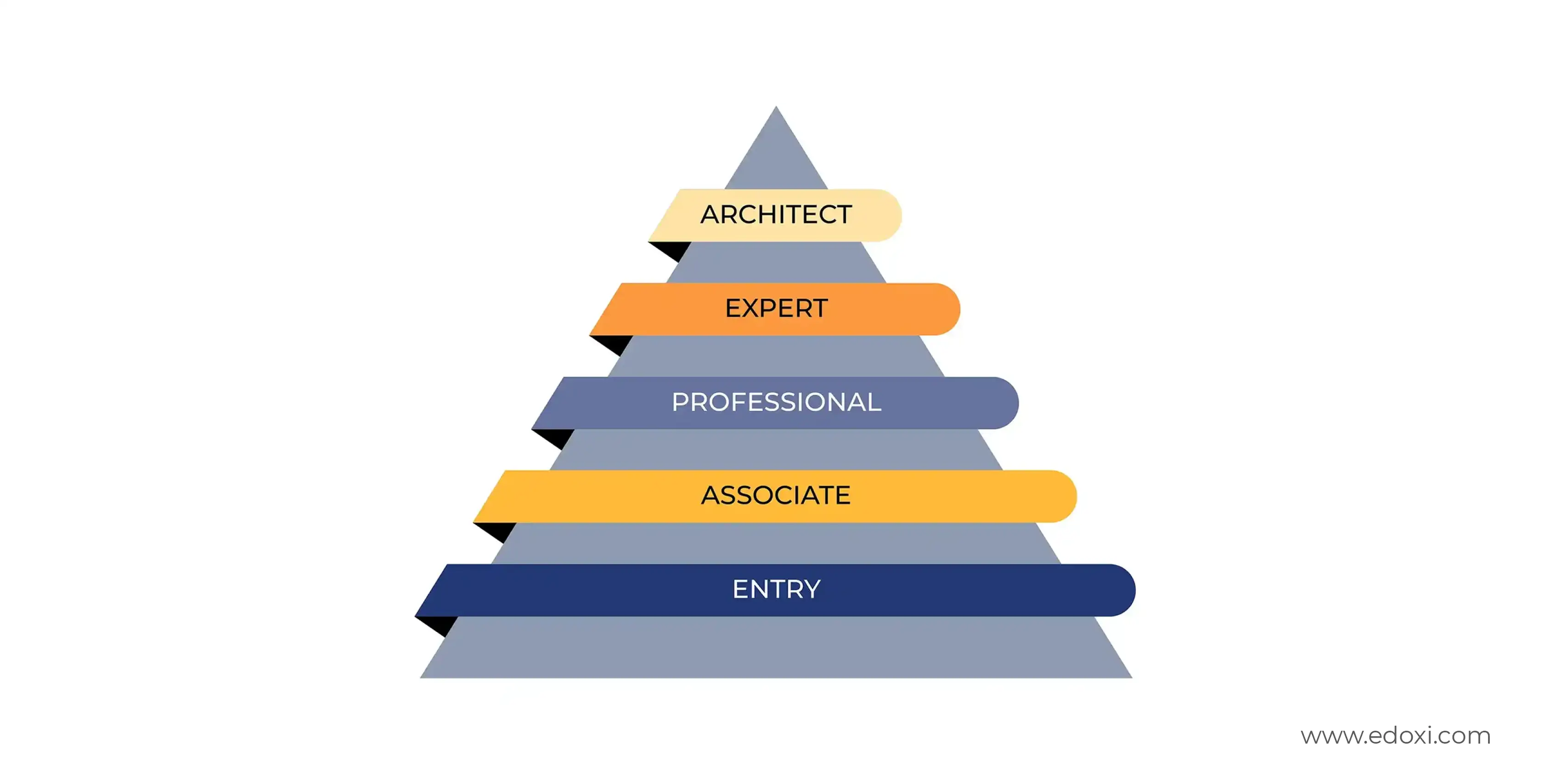The CCNA Course will help you gain the practical knowledge and expertise needed to manage modern network infrastructure effectively. Edoxi offers a KHDA-approved 40+ hour CCNA course in Dubai aligned with Cisco's latest official CCNA v1.1 (200-301) curriculum. The Course will help you gain a complete understanding of networking fundamentals, security, automation, and programmability. You will gain vital skills in Cisco IOS, IP addressing, VLANs, routing protocols, troubleshooting, automation, and network security using Access Control Lists (ACLs).
The Cisco Certified Network Associate (CCNA) is a globally recognised entry-level IT certification. It serves as a foundation for advanced credentials like CCNP Enterprise, CCNP Security, CCNP Datacenter, and CCIE. Edoxi’s CCNA training ensures comprehensive preparation for the CCNA exam through practical labs, real-time scenarios, and hands-on experience with real Cisco devices.
For working professionals seeking flexibility, our Live Online Training provides 40 hours of expert-led sessions delivered virtually. This format includes real-time demonstrations, interactive troubleshooting exercises, and flexible scheduling. For organisations, we offer 4-5 day Corporate Training that is fully customizable to meet specific business requirements. The training can be delivered on-site at client premises, virtually, or at Edoxi’s training facility in Dubai.
After completing our training program, you'll gain the knowledge and confidence needed to successfully pass the Cisco CCNA certification exam. Upon clearing the exam, you’ll earn an official Cisco logo and unique certification ID, which employers can easily verify as proof of your expertise. Additionally, you’ll receive a CCNA certification from Edoxi upon finishing the course, further enhancing your professional credentials.
Edoxi’s CCNA Course in Dubai aligns with Cisco's latest official CCNA v1.1 (200-301). We provide study materials tailored to CCNA exam objectives. The learning resources include Cisco IOS CLI and configuration guide PDFs. The following table will provide you with a complete understanding of the CCNA exam.
| Exam Categories | Details |
| Exam Name | Cisco Certified Network Associate (CCNA) v1.1 (200-301) |
| Duration | 120 minutes |
| Number of Questions | 100-120 questions |
| Question Types | Multiple-choice, drag-and-drop, simulations, and Test |
| Exam Fees | USD 300 + Taxes |
| Certification Validity | 3 Years |
| Recertification | Pass a higher-level Cisco certification exam OR earn Continuing Education (CE) Credits |
| Exam Administration Authority | Pearson VUE |
Cisco Certification Path
EDOXI's CCNA Course is the ideal starting point for anyone who wants to pursue a fulfilling career in Dubai’s flourishing IT and networking industry. The CCNA certification is an entry-level Cisco certification and opens pathways to advanced Cisco certifications and specialised job roles.

You can gain hands-on experience with genuine Cisco equipment, ISR Series routers, Catalyst switches, and next-generation firewalls.
You will get access to study materials tailored to CCNA exam objectives. The learning resources include Cisco IOS CLI and configuration guide PDFs.
You will use professional tools such as the Cisco Packet Tracer. Also, design, implement, and troubleshoot complex network scenarios in a safe, simulated environment.
You will learn in a small batch size for personalised attention. Get extensive hands-on practice with enterprise-grade networking equipment.
You get to create and implement a complete enterprise network solution. Work on VLANs, routing protocols, security measures, and network automation components.
You’ll get a chance to take part in guided troubleshooting exercises. Address real-time issues like interface errors and security implementations to prepare for on-the-job challenges.
IT Graduates and Entry-Level Professionals looking to build a strong foundation in enterprise networking.
IT support technicians or junior system administrators aiming to advance their careers.
Professionals in the telecommunications field seeking IT infrastructure and enterprise networking skills.
Individuals planning to transition into the IT sector in Dubai's competitive job market.
Technical support staff working on network infrastructure who require certification and practical networking expertise.
Current system administrators looking to enhance their skills in network administration and security implementation.
Edoxi’s CCNA training includes extensive hands-on sessions focusing on real-world network implementation scenarios. The following are some of the projects in our hands-on practical sessions.
You will design and deploy a complete enterprise network infrastructure, incorporating VLANs, inter-VLAN routing, and routing protocols. You will also configure the OSPF routing protocol and implement security measures such as ACLs and device hardening.
You will configure advanced security features, including DHCP snooping, dynamic ARP inspection, and port security. Also, implement wireless security protocols and access control mechanisms across the network infrastructure.
You will deploy and configure essential network services like NAT, DHCP, and DNS. You will perform systematic testing to ensure proper operation.
You will set up and configure wireless networks using Cisco Aironet Access Points. You will implement WPA2/WPA3 security protocols and optimize wireless coverage through proper channel management.
The CCNA certification opens up diverse career opportunities in Dubai's growing IT sector, particularly network administration and infrastructure management. Here are a few course outcomes that you can expect after attending our CCNA course in Dubai;

Get expert assistance in getting your CCNA Course customised!
Here’s a four-step guide to becoming a certified CCNA professional.
Join Edoxi’s CCNA Course
Here are a few reasons why you should choose Edoxi for CCNA Training in Dubai;
Edoxi’s CCNA Certification course is KHDA-approved, ensuring that you receive the highest quality training that you deserve.
Our training facility features genuine Cisco networking equipment, including ISR routers and Catalyst switches. You will gain practical experience with enterprise-grade hardware used in professional environments.
We ensure personalised attention and extensive hands-on practice. This focused learning environment promotes comprehensive skill development and individual problem-solving guidance.
We accommodate diverse learning needs with extended training hours from Monday to Friday (9 AM to 9 PM) and weekend sessions (9 AM to 5 PM).
Our CCNA training is supported by professional simulation software like Cisco Packet Tracer.
By the end of our course, you will receive a KHDA-approved Course completion certification.
Our CCNA training has been trusted by distinguished organizations across Dubai and the region. We have successfully delivered corporate training to Zabeel Saray Hotel FZE and the Africa Union Commission

Our mentors are leaders and experts in their fields. They can challenge and guide you on your road to success!

Sid Ahmed
Sid Ahmed is an IT network infrastructure and security trainer with over 12 years of experience at Edoxi Training Institute, Dubai. He is a certified CCNA/CCNP instructor and NSE 4 trainer and possesses advanced expertise in Cisco networking His portfolio includes prestigious Cisco certifications and hands-on knowledge of global security frameworks, making him a leader in delivering industry-relevant training.
Sid’s knowledge also extends to industry standards such as ISO 27001, NIST, SOC2, and PCI DSS, further strengthening his cybersecurity prowess.Sid Ahmed focuses on developing practical skills through hands-on training with enterprise-grade equipment. As an experienced Network and Security Architect, Sid Ahmed's expertise spans WAN/LAN, IP-MPLS, BGP, Wireless, IP Telephony, and Cybersecurity.He is skilled in HLD/LLD design, audits, pentesting, IT risk assessments, and security frameworks His specialisations include SD-WAN, VPN, VLAN, SSL, SIEM, cloud tech, and routing protocols (OSPF, BGP, STP) Sid is also proficient in Python, MySQL, JavaScript, APIs, and tools like SolarWinds, FortiSIEM, and U2000.
Here is the list of other major locations where Edoxi offers CCNA Course